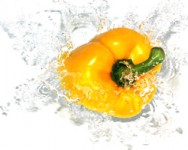Good Agricultural Practices (GAPs) Training
Event Details
Date
March 4 - March 5, 2025
Time
March 4th 8:30 AM - 4:30 PM; March 5th 9:30 AM - 2:00 PM
Location
CCE Onondaga County (or remote via Zoom)
6505 Collamer Rd
Syracuse, NY 13057
Host
CCE Onondaga CountyJanet Oppedisano
email Janet Oppedisano

Hosted by CCE Onondaga County, this two-day workshop* will train fruit and vegetable growers and others interested in produce safety, the Food Safety Modernization Act (FSMA), the Produce Safety Rule, Good Agricultural Practices (GAPSs), and co-management of natural resources and food safety.
See this information from NYS Agriculture & Markets explaining GAP Certification and potential reimbursement for GAP Certification costs.
March 4th
A full day of information to ensure that sound food safety practices are being used on a farm or produce handling facility. You will learn the best agricultural practices to ensure that fruits and vegetables are produced, packed, handled, and stored in the safest manner possible to minimize risks of microbial food safety hazards.
Participants may join Janet Oppedisano in the CCE Onondaga Classroom for virtual presentations from three experts:
- Robert Hadad, Vegetable Specialist, CCE Cornell Vegetable Program
- Laura Biasillo, Agricultural Economic Development Specialist, CCE Broome County
- Lindsey Pashow, Agritourism Statewide Specialist, Agriculture Business Development and Marketing Specialist, CCE Harvest New York
March 5th
Using the knowledge gained from the virtual sessions on March 4th, participants will write their food safety plan in person at CCE Onondaga.
The food safety plan is specific to each establishment and provides guidelines, policies, and procedures to be implemented and documented to minimize potential for microbial contamination.
"Developing a food safety plan is the first step in becoming GAP certified. The food safety plan is specific to each establishment and provides guidelines, policies, and procedures to be implemented and documented to minimize potential for microbial contamination. The plan lays the foundation for what the establishment is doing to produce safe products, as well as for how to handle events involving possible contamination.
Once the food safety plan is written, the establishment will schedule an audit with NYS Ag & Markets. The operation should implement the practices and supporting documentation. The audit consists of steps that require the observation of various practices, as well as the review of supporting documentation in the food safety plan."
Robert Hadad, Laura Biasillo, and Janet Oppedisano will be in-person to assist farmers in writing their specific food safety plan.
COST: $50, includes lunch.
REGISTER: Register online by February 28, 2025.
* A remote attendance option is available. Please contact Janet Oppedisano at 315-424-9485 x243 or email Janet for more information.

Upcoming Events
Eden Area Winter Vegetable Meeting
February 4, 2026
North Collins, NY
Join us for a mix of industry updates, crop protection talks, pesticide safety programming, and fertility management discussions. This meeting is jointly hosted by the Cornell Vegetable Program and Timac Laing-Gro.
1.25 DEC credits available in CORE plus 1.75 in 1a and 23.
Orleans Regional Winter Vegetable Meeting
February 9, 2026
Albion, NY
Topics include: Breeding and evaluating tomatoes to control disease and improve yield, jar testing and ensuring spray water quality, breaking down organic matter, FSMA updates and Q&A with Ag & Markets, and industry updates. Includes hands-on learning, coffee break, and sponsor booths.
DEC credits available: 1.0 in CORE plus 0.5 in 1a, 10 or 23
Good Agricultural Practices (GAPs) Food Safety Training
March 10, 2026
Newark, NY
Learn about food safety on the farm! This event hosted by the Cornell Vegetable Program, Cornell Lake Ontario Fruit Team, CCE Wayne County, and the NYS Department of Agriculture, will cover good agricultural practices (GAPs) to help reduce the risk of microbial contamination on the farm, keeping food and consumers safe.


































